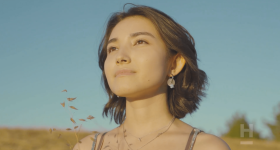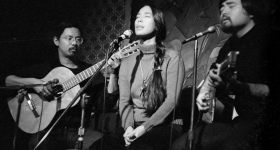In the video for “Mrshmlo,” the lead single off Rocky Rivera's eponymous debut LP released earlier this year, the emcee stares down the camera behind flowing lashes, her cropped faux hawk bobbing to the beat as she waves a manicured nail with a no-you-didn’t bravado.
Leaning against a car and sporting sky-high stilettos and a necklace strung with bullets, the 27-year-old Filipina flashes a gold grill between ruby red lips, from which come the lyrics: “I’m a 5-foot, I’m a looker/Good enough to eat but I’ve never been a sucka.”
Even a trait as seemingly straightforward as “sexy” is executed with studied complexity — a sustained tension between video-vixen come-ons and tomboy swagger that practically defines the personas of some of the most prominent female emcees in hip-hop today.
Rocky Rivera, born Krishtine de Leon and also known by the emcee alias EyeASage, is part of a rare breed: the Asian American female emcee in the hypermasculine and predominantly black world of contemporary hip-hop.
If one Filipina spitting on a mic is a political statement, imagine four. In the mid-2000s, de Leon was part of a Filipina American emcee collective in San Francisco called the Rhapsodistas, which fused community and activism with music.
Asian female rappers — not to mention a quartet of them — have been rare compared with the slew of African American women in the rap game. Pioneers like MC Lyte, Roxanne Shante and Queen Latifah, and even contemporary artists like Lil’ Kim and Jean Grae, have helped erode the novelty of black women in rap — something that continues to be an issue in the Asian American hip-hop community.
The story of the group, of which de Leon is the only member still in the music industry, illustrates the particular challenges faced by these Filipina American emcees, many of which persist today.
De Leon founded the Rhapsodistas in 2004, along with spoken-word artist Irene “Shortyrocwell” Duller and two other women they met through San Francisco State University’s League of Filipino Students, Valerie “Sho Shock” Francisco and Natasha “Sola” Pineda. (A fifth member, Liezel “Zelstarrr” Rivera, joined later as a singer.) All four 20-somethings were college-educated immigrants who were bred on hip-hop culture.
Francisco believes the group provided more than just novelty for hip-hop audiences.
“We were saying things in specifically different ways,” she said. “After people got over the shock that there were four amazingly beautiful, gorgeous women going as hard as we could, they were also really appreciative over the things that we would talk about, which sometimes was just girl stuff, lady things, and other times we were talking about community things, like human rights violations in the Philippines — things we were passionate about politically.”
The group recorded its first song for MySpace in a friend’s closet, and it gained popularity quickly. “It was definitely surreal to me that there was that power to allocate space as women to make art, and bam — the next minute, we’re on stage performing it,” Duller said. “That was empowering for sure.”
The Rhapsodistas played shows mainly at underground hip-hop clubs and community events. A large chunk of their support came from the San Francisco Bay Area organizing community, due to the Rhapsodistas’ affiliation with political Filipino groups.
But with that support also came particular expectations. They were sometimes the only female emcees on a bill, and Liezel Rivera said the group struggled against being pigeonholed in the confines of feminist-related subject matter.
“We’re women and we represent that to the fullest, but sometimes we want to talk about love, and sometimes we might want to talk about my car getting broken into,” Rivera said. “People think women can’t be complex.”
In fact, de Leon said her legitimacy as a true emcee is often questioned within the broader music industry. “[The most difficult thing is] really convincing people that I’m hip-hop, too,” said de Leon, who appeared on the 2007 MTV reality show I'm from Rolling Stone, where aspiring journalists worked as interns at Rolling Stone. “I was born into hip-hop, but for some reason because of what I look like or who I am or my gender, the question is raised about how much of that lifestyle I really live.”
In the street cred-obsessed world of hip-hop, questioning the validity of the Rhapsodistas was an easy shot; after all, the members met through the college circuit. But hip-hop was pervasive while they were growing up in California in the ’80s and early ’90s.
“The most available form of music to me growing up in a low-income neighborhood was definitely rap,” said Francisco, whose brother was involved with gangs. “We took inspiration from the struggles of our mothers and our fathers being immigrants and what it was like for us to be uprooted from our homelands and raised here and struggling with those identities. And the university was the place where we first started to unpack those things.”
Highly aware of their identities and how they were representing themselves, but with no blueprint to follow, the Rhapsodistas struggled with evoking the appropriate on-stage personas, ones that neither hardened them into thugs nor debased them into video vixens.
“We were often transforming,” Duller said. “One moment we were too hard. The next moment it was like, ‘Let’s wear our female sensibilities.’ ”
In 2006, the group slowly parted ways, pulled away by the responsibilities of school, careers, political organizing and raising families. The difficulty of committing time to the Rhapsodistas was also exacerbated by the misogynistic, racially codified culture of hip-hop.
“This is being really honest, but I don’t think we were really sold on us,” Francisco said. “Because hip-hop is a male-dominated place, it was like, ‘Let’s do this and see how far it goes and just hope for the best.’ “
De Leon is now the only Rhapsodistas member pursuing a music career full time. “I was watching VH1 the other night and they were talking about how all these groups have their one diva person, like Diana Ross or Beyoncé,” said Francisco, who is working on a dissertation at the City University of New York on Filipino domestic workers and transnational families. (Duller is a professor at San Francisco State University and University of San Francisco.) “Not to say that Krish is a diva, because she’s definitely not. But I think she was definitely more serious about committing herself as an artist.”
Rocky Rivera features the same charismatic, focused emcee that de Leon always was, but the screws are tightened a little harder. She has a playful yet hard-hitting flow evocative of Slick Rick, but imbued with subject matter more commonly found in spoken-word cafes. On “Girl Like Me,” de Leon rides a reggae-tinged beat, rapping about a man’s misdeeds: “I know you see her in the video grinding in a miniskirt, bragging to your boys about the things you want to do to her/Oh boy, you’re just a sucker for the dirty wine, pulling all the dirty girls, thinking with a dirty mind.” On “Heart,” she mentions social justice icons Angela Davis and Dolores Huerta.
Those looking to follow a similar route to a career in hip-hop will likely face the same challenges that de Leon and the Rhapsodistas experienced. “It’s definitely not going to be a walk in the park,” Duller said. “But that’s the type of female Asian emcee that we want to be broadcasted, because those emcees will be the ones to rise above the bullshit. And there’s a lot [to fight against], whether it’s your male counterparts or the DJs hitting on you or getting paid less or being put in the front of the lineup when no one’s there yet.”
For de Leon, who has a 2-year-old son with rapper Bambu (formerly of the rap group Native Guns), the question isn’t how or if, but when. “I have a family to feed, I have a future that I really have to prepare for,” she said. “It makes things more serious. You can’t keep talking about it. It’s time to do something about it.”
Mitchell Kuga is a writer living in Honolulu.









Comments